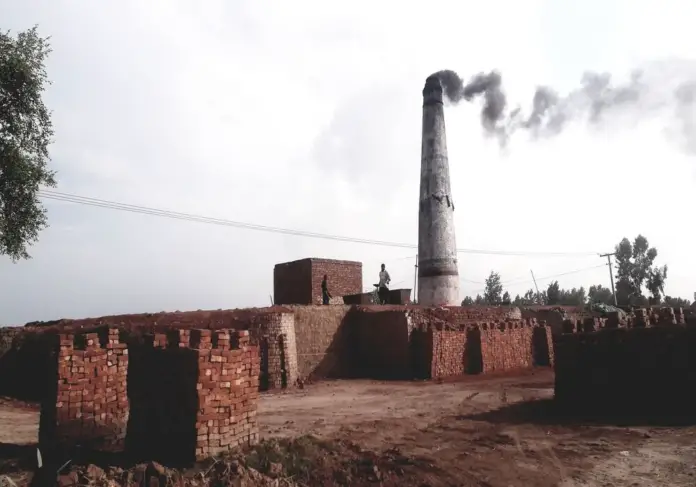Despite all the brick kilns in the Faisalabad district being shifted to zigzag technology, the desired results of the anti-smog campaign were not being achieved because even today, smoke from the kilns was considered a significant cause of air pollution.
Faisalabad has become the most polluted city in Punjab in terms of air quality index (AQI) due to air and environmental pollution. The Environment Protection Department (EPD) does not have comprehensive resources available from the transferees of zigzag technology of kilns and implementers of SOPs. They were limited to imposing fines or filing FIRs.
According to details, there were 433 brick kilns in the Faisalabad district. Thanks to the efforts of the EPD Faisalabad, all these kilns were converted to zigzag technology, which was also being monitored. But later, four new subsections were added to make the kilns, which had shifted to zigzag technology, operational and prevent air pollution.
All kilns that have been crystallised would be declared to have zigzag technology. This was followed by four subsections, including crystallisation of all kilns, power connection and availability of generators, use after coal crushing and filling of bricks in specific stages.
On the direction of the Punjab EPD, a particular campaign was being carried out in the Faisalabad district by the district administration and EPD officials officials regarding the anti-smog campaign.
The concerned officers were visiting different areas and monitoring the kilns, and cases were being registered against kiln owners for violating SOPs, and heavy fines were being imposed. However, kiln owners believed that their kilns had zigzag technology, but the district environmental officers were fining them just for completing the paperwork.
According to sources, the operation of kilns across the district and monitoring of issued SOPs was a difficult task for the EPD. Because when the district administration and the environmental officers visited the kilns, they also reviewed the other four sub-sections, including the transfer of the kiln to zigzag technology and decided whether the kiln was operational as per desired technology or violated SOPs. If a kiln was declared satisfactory two weeks ago, it was heavily fined after 15 days, under the pretext of SOPs.
As per Faisalabad EPD, implementing the other four sub-sections has changed since the zigzag technology phase. And if the relevant SOPs were not implemented, black smoke would be emitted from the kiln chimney, which would cause air pollution and smog. And if the applicable SOPs were fully implemented, then the kilns that were being shifted to zigzag technology, were not pushing out air pollution or smog. Therefore, monitoring kilns was an ongoing process that must be continued in all cases.
It would also be worth mentioning here that there was a shortage of officers and field staff in the Faisalabad EPD, which has raised a question mark over kiln monitoring.
In this regard, Environment Deputy Director Waseem Ahsan Cheema said that in light of the orders of the Punjab EPD, Provincial Disaster Management Authority (PDMA) and Lahore High Court in Faisalabad district, strict action was being taken against those who did not implement the prevailing principles of zigzag technology.
At present, all the kilns across the district have shifted to zigzag technology, and only those kilns which were implemented SOPs were being allowed to operate. Action would be taken against the violating kiln owners.
Cheema further said that since October 7, 2021, 243 kilns were inspected, and cases were been registered against 131 persons for various violations and 88 kiln owners were also fined Rs4.5 million. He further said that the district administration and the environment department had taken action against the elements for spreading pollution and non-compliance with government orders daily.
Meanwhile, the District Development Committee has approved the implementation of 72 development schemes of Roads Construction Division, Highways, Public Health Engineering Department (PHED), Water and Sanitation Agency (WASA), Lahore Development Authority (LDA), and Faisalabad Electric Supply Company (FESCO), under the Sustainable Development Goals Achievement Program (SAP) IV at the cost of Rs514 million.
A meeting of the District Development Committee was held under the chairmanship of Deputy Commissioner (DC) Ali Shehzad. Deputy Director Development Rana Tahir gave a briefing on the technical and administrative aspects of the development schemes under SAP Phase IV. Assistant Commissioners Sahibzada Muhammad Yousuf, Mansoor Qazi, officers of roads, highways, PHED, WASA and FESCO were present.
The meeting was informed that four schemes of Roads Construction Division, two schemes of highways, 31 schemes of PHED, five projects of WASA and 30 schemes of FESCO would be completed under the program.
In the rural and urban areas, carpet construction of various roads and streets, repair and maintenance of the rural drainage system, the accuracy of sewer system, installation of water filtration plants and electricity poles, would be completed.
While reviewing the territorial requirement and fidelity of the development schemes, the DC said that expeditious departmental measures should be taken on the schemes approved during the meeting so that these projects could be completed. Instructing to keep all the relevant rules and regulations in mind in the schemes, he said any obstacle or problem should be resolved immediately.
There would be no compromise on completeness and transparency, he added.







